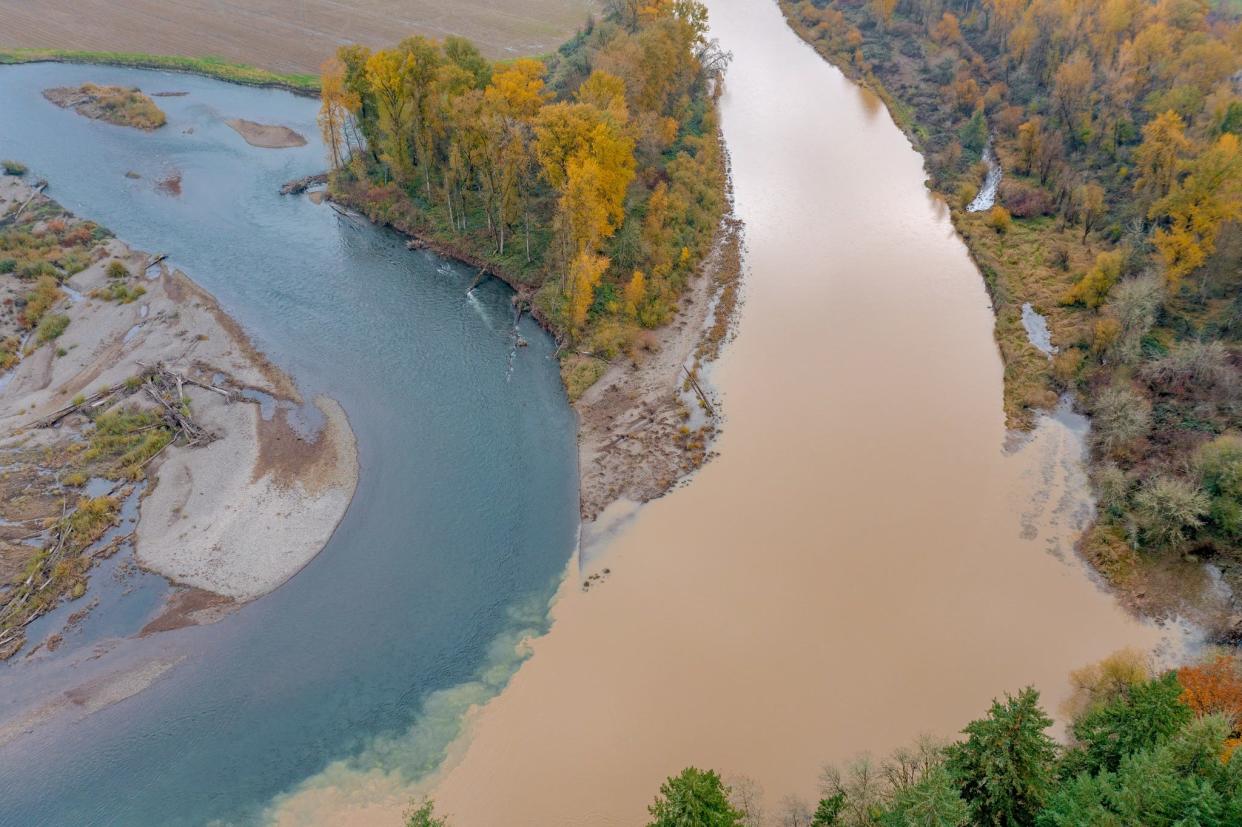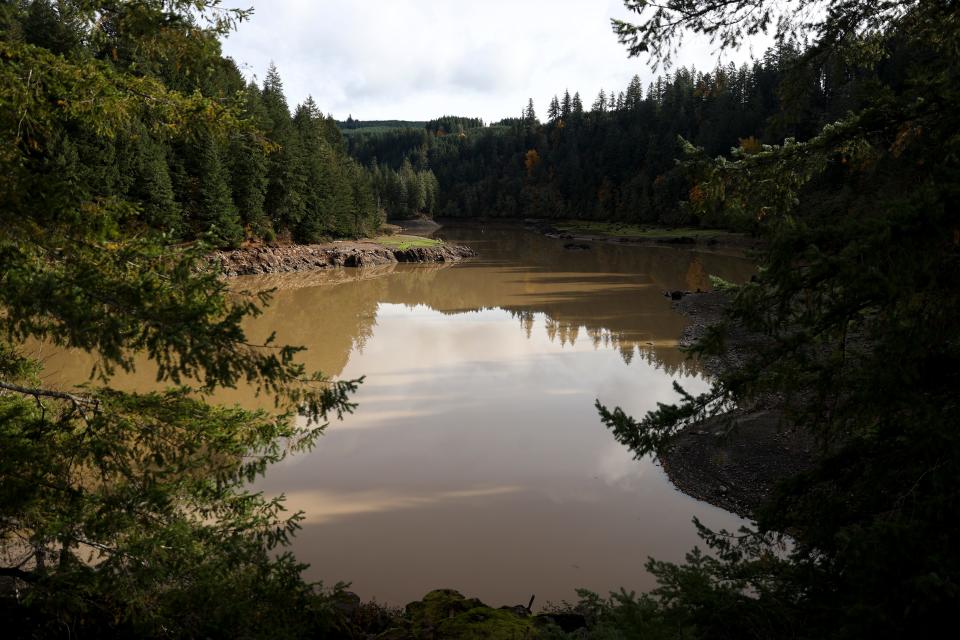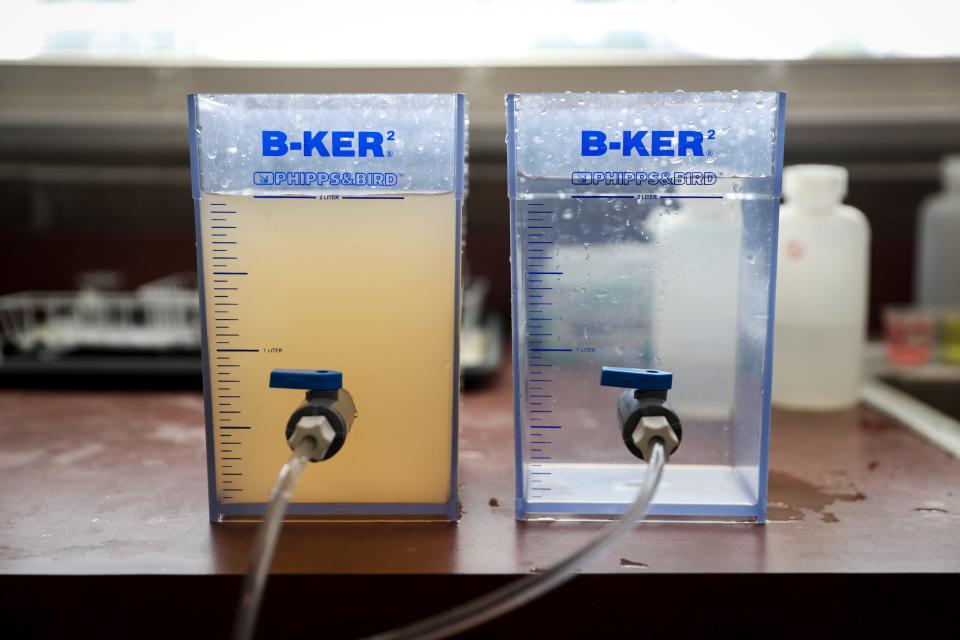Oregon lawmakers ask judge to ‘modify’ reservoir drawdowns that brought muddy water

Twenty rural Oregon lawmakers have asked a federal judge to modify a ruling that has impacted drinking water, wildlife and dried-up wells near Green Peter and Lookout Point reservoirs.
A letter sent to U.S. District Court Judge Marco Hernandez last week came in the wake of deep reservoir drawdowns by the U.S. Army of Corps of Engineers, meant to help endangered salmon, that flushed extremely muddy water into the drinking water systems of Sweet Home, Lebanon and Lowell this fall.
The sediment in the water, more than 10 times as potent as normal, taxed city water filters and led to increased use of chemicals to keep water at safe levels in the towns. The situation angered locals, who said the water tasted poor and was discolored. Some switched to bottled water.
Hernandez ordered the drawdowns to help endangered juvenile spring chinook migrate through openings in the dam following a lawsuit from three environmental groups — Native Fish Society, Northwest Environmental Defense Center and WildEarth Guardians.
"We respectfully request you modify your 2021 order that led to the deep drawdowns of our dams, and prevent these negative effects happening to even more communities around our state. Our communities deserve a seat at the table in the decision-making processes regarding dam management," wrote a group that included two state senators, three state representatives and a collection of mayors and county commissioners, mostly from Linn and Marion counties. U.S. Rep. Lori Chavez-DeRemer, R-Oregon, wrote a similar letter earlier in the year.
The situation even drew concerns from Willamette Riverkeeper, an environmental group that has filed lawsuits related to native fish and dam operations in the past.
"It may be worth reconsidering how the U.S. Army Corps approaches any future drawdowns, with additional opportunity for organizations and the local community to weigh in on the path forward," wrote Travis Williams, executive director of Willamette Riverkeeper, in a letter sent to Hernandez.

Water issues easing, reservoirs to rise
Heavy rain has caused the reservoirs to rise somewhat in December, which has reduced the amount of sediment being flushed downstream. Sweet Home city officials said the impact on drinking water hasn't been quite as bad as it was previously.
"We are continuing to produce safe water and it’s not requiring quite as many additional hours from public works staff as before, but we’re still operating differently from normal as the turbidity fluctuates," said Cecily Pretty, administrative services director.
The Corps will begin refilling Green Peter and Lookout Point to normal levels beginning Saturday, which should diminish the amount of mud in the water even more, Corps officials said.
However, as of now, the same drawdowns would occur next year and in future years.

For future years, can the judge change the order?
Hernandez cannot change his ruling based on the letters or complaints, but he could make a modification if one party in the lawsuit moves to amend the court’s order.
Greg Taylor, lead fish biologist for the Corps, said the agency would submit a report in late February "that will have some of the fish and water quality results," he said.
"We will be looking hard at the results after the New Year and based on that, we'll likely bring forward some changes for the judge to consider," Taylor said.

Gov. Tina Kotek weighs in
At a press conference in late November, Gov. Tina Kotek said her office was looking for a solution.
“Right now, we don’t have a solution," Kotek said. "We’re coming into legislative session, maybe there are some things we can do but we’ll also need help from our federal partners at the Corps of Engineers to help us pay for some of the impact of the drawdown. Drawdown for the fish? Necessary. How they went about it? Not good."
Environmental groups defend lawsuit
The Native Fish Society, one of the groups that brought the lawsuit leading to the drawdowns, said it supported financial relief for cities such as Sweet Home due to the impacts of the muddy water.
However, they said drawdowns can work if given time, and that the impact of muddy water would ease in future years.
“If we get fish passage right, we really can restore wild spring chinook in the Willamette — this iconic Oregon fish. That would be a boon for every community in the Willamette Valley,” Mark Sherwood, executive director of the Native Fish Society, previously told the Statesman Journal.

No relief for Sweet Home yet
Multiple lawmakers and the environmental groups involved in the lawsuits have called for Sweet Home and Lebanon to get funding to support their drinking water systems amid the muddy water from the drawdown.
So far, nothing has happened.
"As of right now, we do not have any formal commitments from state or federal sources for any resources related to the drawdown at Green Peter," Pretty said.
Urban-rural divide
The letter from the lawmakers emphasized the drawdowns have brought echoes of Oregon's so-called Timber Wars, when lawsuits over the spotted owl impacted rural towns by limiting logging.
They noted the drawdowns not only impacted water but also recreation and fishing. The drawdowns killed tens of thousands of fish earlier this summer.
"The tourism sector is threatened not only by these drawdowns, but by the uncertainty of what the future holds for these community resources, jeopardizing the economic outlook for our communities while also sustaining the costs associated with these drawdowns," the letter said.
Letter to Judge Hernandez from rural Oregon lawmakers by Statesman Journal on Scribd
Letter to Judge Hernandez from Willamette Riverkeeper by Statesman Journal on Scribd
Zach Urness has been an outdoors reporter in Oregon for 15 years and is host of the Explore Oregon Podcast. Urness is the author of “Best Hikes with Kids: Oregon” and “Hiking Southern Oregon.” He can be reached at zurness@StatesmanJournal.com or (503) 399-6801. Find him on Twitter at @ZachsORoutdoors.
This article originally appeared on Salem Statesman Journal: Oregon lawmakers ask judge to ‘modify’ reservoir drawdowns

